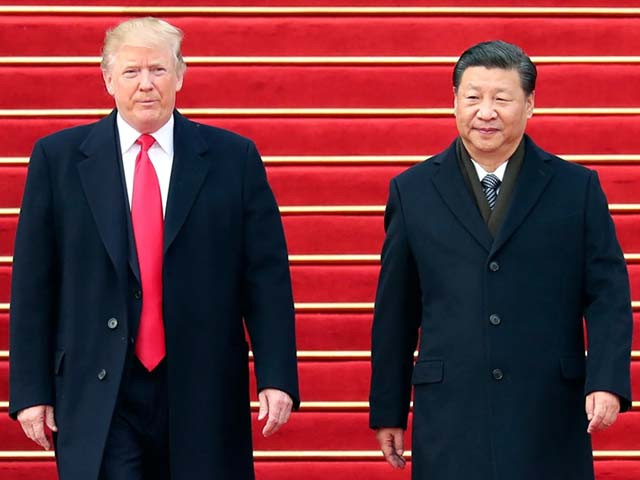An exceptional country in an existential predicament? Most of us have known the United States (US) as the supreme global power that has altered the course of history time and time again. Its prowess in almost any given field – from technology to education – had become equated to an extraordinary case. While we may be critical of the havoc that the US had left in the wake of its foreign policy, we still believed that America was an exception to the rules of global politics. The ordinary rules of the game did not apply in its case. However, while the change has been gradual, it is now here. The outbreak of coronavirus has brought forward the depth of this change: American exceptionalism is now seen for what it is – a myth of the past.
We now live in a world with another rival for global leadership: China. At the end of last year, the outbreak of coronavirus in the Chinese city of Wuhan opened new cracks in the fate of this contention for leadership in the 21st century. The country’s response to Covid-19 first stirred controversy when there were accusations of a cover-up given the tight controls on information and media censorship that hurdled investigative reports about the initial outbreak. The US has tried to ensure that the first two weeks in which the Chinese administration tried to cover the whistleblowers should not be forgotten. But China, under the leadership of President Xi Jinping, was quick to strategise an effective response to curb a virus that had become a pandemic in the course of a few weeks.
While the Chinese response to the pandemic, along with other East Asian countries, has proven to be one of the most effective, the US, on the other hand, is on a track towards one of the worst outbreaks among wealthy nations. The pandemic brings with it a weakening of America’s image in the world. In a TED discussion, Fareed Zakaria, a prominent journalist and political scientist, spoke about how America’s soft power has taken a beating due to the inequities in the country’s healthcare system now being out in the open for the world to see. On the ground, healthcare workers and scientists are involved in robust collaboration and knowledge-exchange to defeat the pandemic, but in the world of politics there’s a war to seize the global narrative of Covid-19. So, how will history remember this moment? Will America rise to the challenge and recover as it has from time to time? Or will China, ultimately, make history?
America’s Covid-19 narrative
The US leadership is involved in an effort to brand the virus as exclusively “Chinese”. In fact, Secretary of State Mike Pompeo has used the name “Wuhan virus” while President Donald Trump has referred to Covid-19 as the “Chinese virus” on multiple platforms. The Trump administration has requested the United Nations Security Council to include a statement that verifies the origin of virus in China. Moreover, US Senator John Cornyn also blamed “Chinese culture” for not only Covid-19, but also for other infectious diseases. He criticised China’s “appalling hygiene conditions in wildlife markets” and the customary diet of bats and pangolins.
While some analysts have argued that this top-down narrative construction is a way for the administration to deflect blame from its own failings towards the origin of the virus in Wuhan, it is also a mechanism to seize the global narrative about how the world will remember the coronavirus outbreak. However, in the midst of this narrative construction through simplistic and vague cultural arguments, there has also been a stark increase in reports of bigotry and hate crimes against Asian Americans during the coronavirus. It is the local communities that bear the brunt of a government’s top-down agenda – whether it is in the US or China.
China’s Covid-19 narrative
China’s initial response to Covid-19 triggered a crisis of confidence in President Xi Jinping’s leadership, but China was quick to retain control with an effective response to the pandemic. The abiltiy to curb the coronavirus outbreak gave China enough credibility to drift the attention away from its initial failings. Even other best responses to the pandemic came from countries with an ethnic Chinese majority government, like Taiwan, Singapore, and Hong Kong. Moreover, the lack of preparedness of advanced, postindustrial, Western democracies and increased divisiveness within them also gave China a window of opportunity to seize the narrative through the role of a global saviour – a role that America has traditionally taken during a global crisis.
A new global saviour?
After Beijing’s coronavirus cover-up attempts for two weeks, the Chinese government was quick to not only demonstrate a coordinated response to the pandemic, but also started an aggressive aid campaign to overwhelmed countries around the world. China has sent masks, gloves, ventilators, and medical experts to many European countries, including Italy, Spain, France, Greece, the Czech Republic, which have displayed neither European nor Euro-American solidarity amongst themselves in the face of this pandemic. The Jack Ma and Alibaba Foundations have delivered relief packages to dozens of countries ranging from Uganda and Pakistan to even the US. Moreover, Chinese coronavirus aid has been supplied to countries all over the world, particularly the countries in the Belt and Road Initiative (BRI). Some officials have also referred to this diplomacy tact as a means to establish a “health silk road”. Beijing is bent on making sure the world remembers that it was the Chinese that came to their help.
How will history remember this moment?
The local communities in both China and the US have suffered, in one way or another, due to government failings. Yet the two countries continue their war of narrative-construction to frame the crisis in the most favorable way for their self-interest. China has under-reported cases and covered-up the coronavirus outbreak in the initial two weeks, while the US administration has failed to come up with a coordinated and effective response to the pandemic, while its racial tensions and healthcare inequities are out in the open for the world to see. So what happens now?
American soft power has taken a heavy blow amidst the crisis, while China is on the path to leverage this blow to further extend its influence under the “silk road of health”. As America looks inward, China wants to take the country’s mantle of being a global saviour during the pandemic. But the Chinese leadership will not be a simple replacement of a century of American exceptionalism. In an inter-connected world, both the countries need to work together to overcome a global crisis, particularly one as formidable as Covid-19. They have both displayed their failings, but will they continue to wage a war of narratives to frame the crisis for their self-interest or endeavour to work together to defeat the pandemic through enlightened self-interest? Time will tell.
The geopolitics of Covid-19: How will history remember this moment?
An effective response to curb Covid-19 gave China enough credibility to drift attention away from its initial failings

Xi Jinping holds a ceremony to welcome Donald Trump at the square outside the east gate of the Great Hall of the People in Beijing, 2017. PHOTO: AFP


COMMENTS
Comments are moderated and generally will be posted if they are on-topic and not abusive.
For more information, please see our Comments FAQ